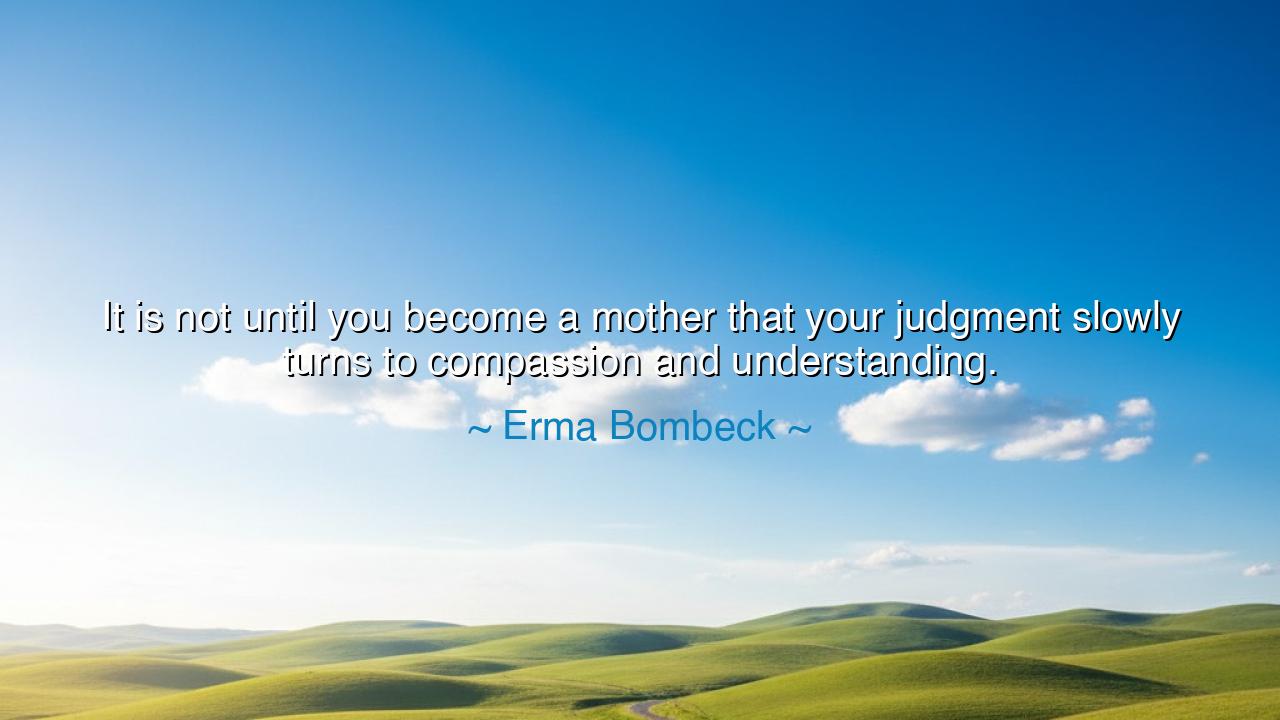
It is not until you become a mother that your judgment slowly
It is not until you become a mother that your judgment slowly turns to compassion and understanding.






Hearken, O children of wisdom, to the gentle yet profound words of Erma Bombeck, who wrote: “It is not until you become a mother that your judgment slowly turns to compassion and understanding.” Within this truth lies the quiet transformation that defines the soul of motherhood—a journey from opinion to empathy, from righteousness to mercy, from the mind to the heart. Bombeck, in her wit and tenderness, spoke as one who had seen how life humbles certainty. Before motherhood, the world appears simple, divided between right and wrong; after motherhood, it becomes a tapestry of nuance, shaped by love and the frailty of human striving.
In the days of the ancients, wisdom was said to come through experience, not through knowledge alone. So it is with motherhood—for no book, no counsel, no philosophy can teach what the heart learns when it begins to nurture another life. Before becoming a mother, one might judge the crying child, the exhausted parent, the unkempt home, or the seemingly endless sacrifices of others. But once one steps into that sacred role, judgment gives way to compassion. The sleepless nights, the worries, the constant balancing of love and duty—these open the heart to the shared suffering of all who labor in love.
Bombeck’s words spring from her deep understanding of the everyday heroism of mothers. Known for finding wisdom in the ordinary, she reveals that understanding is born not from distance but from nearness. When a mother holds her child, she begins to see her own parents anew. Where once there might have been criticism, there grows forgiveness. The harsh edges of judgment soften in the warmth of lived experience. It is as though motherhood awakens an ancient truth buried in the human heart—that love is not a verdict, but a bridge.
Consider the story of Louisa May Alcott, author of Little Women, who grew up in hardship under the guidance of her mother, Abigail May. Louisa once judged her mother’s endless sacrifices, her quiet endurance amid poverty and struggle. Only later, after caring for her own family, did she write with newfound reverence, saying that her mother’s patience had been the truest form of strength. The transformation mirrored what Bombeck described: that empathy blossoms from experience, and the once-judging heart becomes the heart that forgives, the heart that understands.
In the greater tapestry of life, motherhood is but one form of this awakening. Every soul who has ever cared for another—who has seen vulnerability and borne responsibility—knows this alchemy. Compassion is the fruit of understanding, and understanding the fruit of love. When one realizes how fragile joy is, how fleeting peace can be, one learns to hold others with gentler hands. This is the divine education of the heart, the slow unfolding of wisdom through tenderness.
The lesson that flows from Bombeck’s words is clear and luminous: do not be quick to judge, for you do not yet know the full burden another carries. Life will teach you, as motherhood teaches, that mercy is more powerful than criticism, and understanding more enduring than opinion. Those who have walked through sleepless nights and endless worry come to see that every struggle hides a prayer, every failure conceals devotion.
Practical wisdom arises from this truth: practice empathy before experience demands it. When you see another stumble, remember that they too are learning through trial. Let your words heal rather than wound, your gaze comfort rather than condemn. For to live with compassion and understanding is to live as a true guardian of humanity—seeing not with the eyes of judgment, but with the eyes of love.
Thus, let Bombeck’s insight endure: motherhood transforms judgment into compassion because love reveals what intellect alone cannot see. When one begins to care for another more than for oneself, the heart opens to the great mystery of existence—that to understand another is to become, in some small way, divine. And in that sacred transformation, humanity finds its truest strength, its softest light, and its most enduring wisdom.






AAdministratorAdministrator
Welcome, honored guests. Please leave a comment, we will respond soon